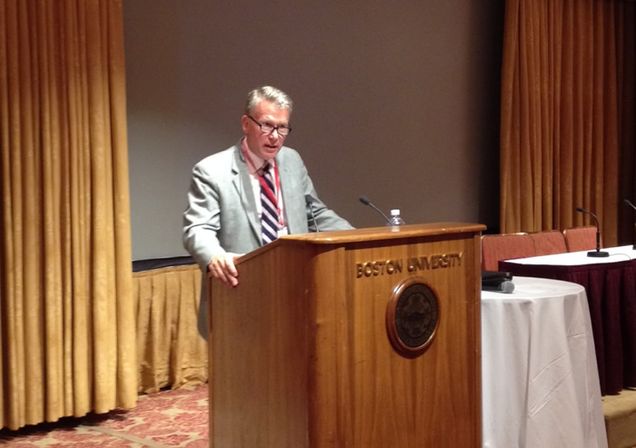U.S. Treasury Official Discusses Lessons Learned from Financial Crisis
Senior Deputy Comptroller Martin Pfinsgraff delivers keynote at Fundamentals of Financial Services Compliance

A senior official from the US Treasury’s Office of the Comptroller of the Currency (OCC) discussed the lessons learned from the 2008 financial crisis during the keynote address at last month’s Fundamentals of Financial Services Compliance, sponsored by BU Law’s Graduate Program in Banking & Financial Law and The Clearing House Association LLC.
Speaking to an audience of compliance officers, banking officials, attorneys and law students in the BU Trustees Ballroom on October 21, Senior Deputy Comptroller for Large Bank Supervision Martin Pfinsgraff attributed the financial crisis to a combination of factors, including poor risk management by banks, faulty rating agency models, the mortgage purchase standards of Freddie Mac and Fannie Mae, and inattentive regulators.
“One of the lessons learned [from the financial crisis] was that regulators could not allow liquidity to sink as low as it did. As regulators, we could do a better job of responding to systemic issues such as those that we saw in the foreclosure market,” he said.
Pfinsgraff also cited a common practice by banks that led to the crisis: “Over a decade, banks outsourced to cut costs, but they did a poor job of overseeing the vendors and ensuring that they were protected on the compliance front. They made bad judgments on vendor management.”
Pointing to improvements in banks’ risk management practices and the government’s regulatory compliance oversight since 2008, Pfinsgraff said, “Operational compliance and risk management are often highly inter-related. They involve redesign of fundamental processes and management information systems and recruitment and training of staff, and they must be accomplished without disrupting the business’ service to current customers.”
The OCC has also strengthened its supervision practices, starting with a peer review of the OCC itself by examiners from other countries, instituting a risk management team to better spot systemic risk, and building out the OCC’s core teams to enhance the consistency and quality of its industry supervision.
Following Pfinsgraff’s talk, the chief compliance officers of three major banks participated in a roundtable discussion about the complexity of compliance issues in the post-crisis environment.
HSBC Executive Vice President and US Head of Regulatory Compliance Gillian Van Schaick said, “Business people are fearful. They have seen some high fines, and they don’t understand the math behind it. People are a little shell-shocked.”
Santander Bank Executive Vice President and Chief Compliance Officer Carol Hunley said, “Each of our institutions is struggling to find ways to make money after the financial crisis. It’s always a challenge to provide the right balance of supporting the organization’s strategic business objectives while ensuring that we do it in a good way and that controls are in place.”
Capital One Senior Vice President and Chief Compliance Officer John Morton agreed: “You want to promote lawful ethical innovations, but you don’t want to be seen as ‘Mr. No.’ The real challenge for compliance officers is the sheer breadth and complexity of the environment in which we live. From OSHA regulations to the Fair Lending Act to anti-money laundering laws, we have to bring a day-to-day pragmatism to the spirit of the law.”